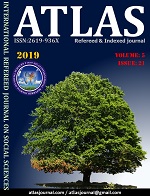A GENERAL ASSESSMENT OF CLASSICAL ORGANIZATION THEORIES
DOI:
https://doi.org/10.31568/atlas.342Keywords:
Organizational Theory, Classical Organization Theories, Taylor, Fayol, WeberAbstract
Organizational theories examine why organizations emerged and the factors that force them to change. Classical organizational theories are the product of a systematic approach to the management of organizations that emerged in the late 19th and early 20th centuries. With the increase of factory production at the end of the 19th century with the industrial revolution, large-scale organizations emerged, issues such as management of these organizations and employee productivity gained importance. Frederick Winslow Taylor's Scientific Management Theory, Henri Fayol's Theory of Management Principles and Max Weber's classical bureaucracy theories are based on similar approaches and influences and form the basis of organizational theories. Classical organizational theories have filled a huge gap in their time, leading to both practical and theoretical approaches. It can be said that these theories form the basis for the theories that will come after them. Some of the principles that are put forward by these theories, while others are revised and are still used in the field of management.
Downloads
Published
How to Cite
Issue
Section
License

This work is licensed under a Creative Commons Attribution-NonCommercial 4.0 International License.


